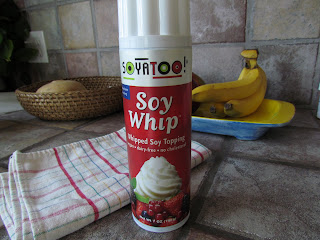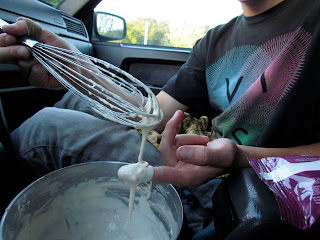I Just underwent some serious oral surgery that left me unable to eat solid food. Not a problem for me though, I whipped up smoothies and green drinks. I also made a killer batch of cauliflower soup. Recipe to follow when I'm feeling better . . .
 |
| fluids . . . |
For snacks a couple days after surgery I added bananas . . . with soy whipped cream of course!
My emergency food . . .
~~~~~~~~~~~~~~~~~~~~~~~~~~~~~~~~~~~~~~~~
 |
| Photograph, 'Totally Tots' blog |
Sugar is Poison says UCSF Obesity Expert.
Vegsource a resource that I often go to for cutting-edge information on health and the vegan lifestyle, posted a lengthy piece about Robert Lustig, MD, a UC San Francisco pediatric neuroendocrinologist, and his studies regarding sugar and health. In this post Vegsource reports;
"More Americans are overweight today than 30 years ago. Kids are still getting heavier, compared with prior generations of kids. That leads some UCSF researchers to warn that heart disease and other health problems will grow in future decades.
But behaviors that some might refer to as gluttony and sloth are merely consequences of the true cause of the epidemic, Lustig says. Food was just as abundant before obesity’s ascendance. The problem is the increase in sugar consumption. Sugar both drives fat storage and makes the brain think it is hungry, setting up a “vicious cycle,” according to Lustig.
More specifically, it is fructose that is harmful, according to Lustig. Fructose is a component of the two most popular sugars. One is table sugar — sucrose. The other is high-fructose corn syrup. High-fructose corn syrup has become ubiquitous in soft drinks and many other processed foods."
Something I found particularly interesting was;
"Lustig claims that fructose is just as bad as alcohol in causing fat storage in the liver — and in causing fatty liver disease."
And more surprising information about how sugar damages the liver;
"Each sucrose molecule consists of one molecule of fructose joined to one molecule of glucose. In the gut, these two components are quickly split apart. High-fructose corn syrup is a less expensive mixture of glucose and fructose. There is no point in belaboring the difference, Lustig says. “High-fructose corn syrup and sucrose are exactly the same,” Lustig says. “They’re equally bad. They’re both poison in high doses.”
Over the past century, Americans have increased their fructose consumption from 15 grams per day to 75 grams per day or more, Lustig explains. The trend accelerated beginning about three decades ago, when cheap, easy-to-transport high-fructose corn syrup became widely available.
Much of processed food labeled “reduced fat” instead has sugar added to make it more palatable, Lustig says. But when it comes to harmful health effects, sugar is worse than fat, he claims.
Consumption of either results in elevated levels of artery-clogging fats being made by the liver and deposited in the bloodstream. But fructose causes even further damage to the liver and to structural proteins of the body while fomenting excessive caloric consumption, Lustig says."
Click here to read 'Dietary Sugar and Mental Illness: A Surprising Link'
From the blog 'Totally Tots':
From the blog 'Totally Tots':
Some important facts about sugar consumption:
- Today’s Consumption: Today, an average American consumes 2-3 pounds of sugar each week. While at the end of the 19th century (1887-1890), the average American consumed only 5 lbs. per year.
- A Continual Rise: Over the last 20 years, sugar consumption in the U.S. has increased from 26 pounds to 135 lbs. of sugar per person per year.
- Hidden Culprits: Sugar consumption includes highly refined sugars that are incorporated into many of the foods we eat (bread, peanut butter, condiments, sauces, etc.). Some of these are better known as sucrose (table sugar), dextrose (corn sugar), and high-fructose corn syrup.
- 4 Classes: 4 classes of simple sugars (Sucrose, fructose, honey, and malts) are deemed “harmful” to optimal health when long-term consumption is over 15% of carbohydrate calories ingested. Hint…complex carbohydrates (veggies, beans, legumes, whole grains) are the way to keep this number below 15%.
- Health Issues: Simple sugars have been documented to contribute to and/or aggravate health problems, including: asthma, mood disorders, mental illness, nervous disorders, diabetes, heart disease, gallstones, hypertension, and arthritis.
- Insulin Impacts: Sugar raises insulin levels, inhibiting the release of growth hormones which depresses the immune system. Further, too much insulin promotes the storage of fat, so that when you eat foods that are high in sugar, you’re enabling rapid weight gain and elevated triglyceride levels, both of which have been linked to cardiovascular disease.
- Degenerative Disease: Sugar has no real nutritional value (minerals, vitamins and fiber) and as a result, has a deteriorating effect on the endocrine system, causing sugar consumption to be one of the 3 major causes of degenerative disease.
- Cancer Culprits: Turns out that cancer’s preferred fuel is none other than glucose. Controlling one’s blood-glucose levels through diet, exercise, supplements, meditation and prescription drugs – when necessary – can be extremely important to a cancer treatment program.
How has cutting sugar out of your diet affected your life?






